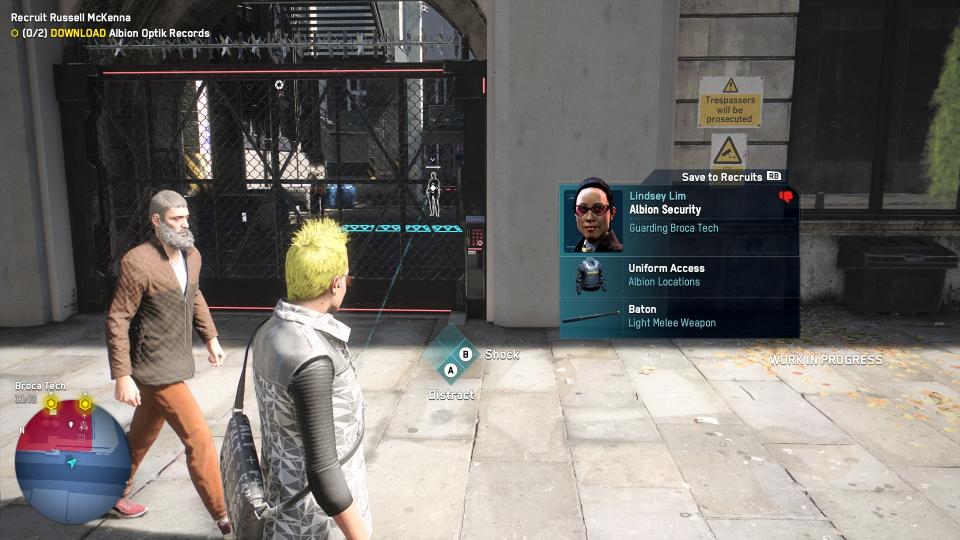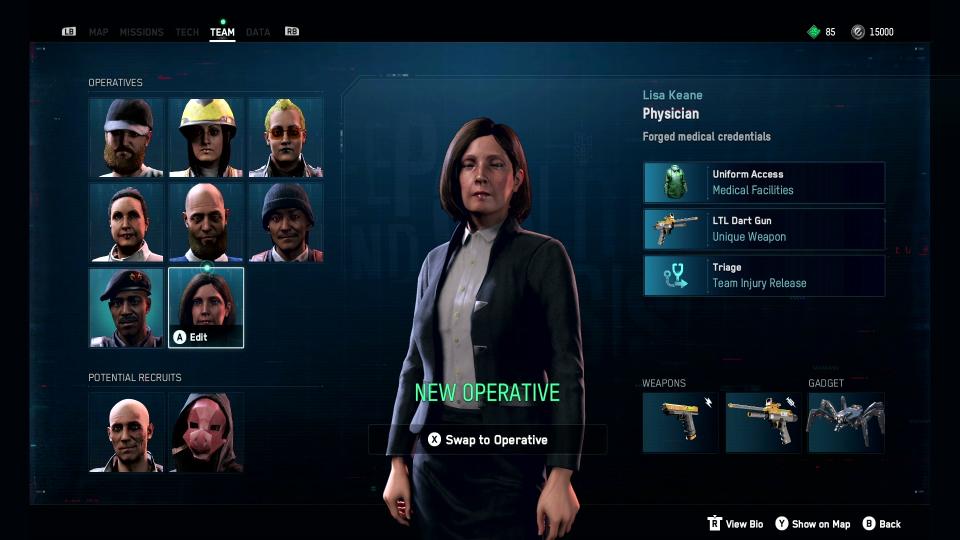'Watch Dogs: Legion' lets you be anyone, if you put in the work
It'll be available on PS4, Xbox One, PC and Stadia on October 29th.
London has fallen. At least, that’s what you’re told when you first visit the dystopian future of England’s capital city in Legion, the third instalment of Ubisoft’s action-adventure series Watch Dogs. Navigating the underground corridors of the Houses of Parliament as an MI-5 agent in the game’s prologue, you quickly understand that DedSec — the subversive hacking group at the center of Watch Dogs 2 — has been framed for a series of horrific bombings at major cultural and tourist spots around London by a mysterious and technologically-advanced group called “Zero-Day” (Ubisoft loves a trope).
These events inspire the government to appoint a private security company called Albion to restore order, resulting in authoritarian regime that is capable of operating with absolute impunity. It’s your job to take back London, but Albion — led by CEO Nigel Cass — isn’t going to give up easily, nor or the other criminal gangs that have sprung up around the city.
Ahead of the Ubisoft Forward event, I was invited to hit the virtual streets of a futuristic London, where drones fill the sky and cars drive themselves, to explore for a little under three hours. I was allowed to complete two of the game’s first real missions and, most importantly, dive into the “play as anyone” mechanic that the company has been championing since the title was first announced at E3 2019. Ubisoft was clear to remind me that my playthrough was by no means a final representation of the game, and that elements could change before its public release.
If you’ve played Watch_Dogs 2, you may (or may not) agree that it was a little too easy to switch the game’s protagonist, Marcus Holloway (with his melee Thunder Ball weapon) from pacifist to a gun-toting hitman. Something felt a bit off about seeing a new recruit slaying with reckless abandon. Legion, while still offering access to weapons, reminds you that violence isn’t always the best answer and instead leans heavily on recruitment — the ability to switch to and utilize any character in the game to literally open doors that may not have been accessible otherwise. However, if you want to go all John Wick, you can do that too.
In Legion, there is no one central character. I played with five characters in the first couple of hours. You merely represent the interests of DedSec, serving as the deciding factor for anyone who wants to expose the truth and clear its name. At the start, you’ll have a small selection of recruits, but it’s on you to pick up others who will add useful attributes — like the ability to escape from the police or fight bare knuckle (really) — to get various jobs done as you progress through the game.

While the first objective is James Bond-esque in its setup, the early missions serve as a useful guide in how to find, recruit and deploy operatives (while also showing you the inside of major historic landmarks like the Tower of London, which has become an Albion base in this fake news-ridden world). During one, I was required to infiltrate a construction site in central London where a possible ally was being held after an apparent kidnap. Vulnerabilities in the ctOS surveillance system — the platform that underpins nearly every connected device in the Watch Dogs universe — allow any character to perform routine hacks, like opening doors or controlling CCTV cameras, but some missions need more of a social touch.
When I was told to access the site, I was able to switch to one of the construction workers in my roster and call in a construction drone. After all, there’s no need to walk through the heavily-guarded front gate when you can fly over the perimeter fence. These D-Pad abilities are unique for every character, meaning that while one person can summon a drone capable of ferrying cargo (and also a human) across the city, another can be instructed to sweep the sidewalk (or pavement) to blend in with the public and escape detection. Each job is unique, meaning that objectives can sometimes feel like a (more methodical) mix of Mission: Impossible, Hitman and a tiny bit of Assassin’s Creed.

Like its predecessor, Legion provides players with easy access to any character’s profile. A quick tap of your controller’s left bumper and you can see their unique abilities, but also their desire to align with DedSec. Given that Albion have set up watchpoints all across London and is beating up citizens, there are a healthy number of people who believe the rumors of a set-up and display a green thumbs-up icon — indicating that they’re up for joining the cause. Others display a red thumbs-down icon want nothing more than DedSec to be brought to justice. Think TiVo thumb ratings but for DedSec sentiment.
Recruitment isn’t completed with click of a button, however. If someone isn’t sympathetic to DedSec, you’ll first need to help them resolve an issue or deal with an objective before they come on board. In effect, you’re completing another side mission, but one that is relevant to the character you want to get on side.
In keeping with the “play as anyone” theme, even the red thumbs can be turned. These characters require more of a brute force approach, which basically means identifying what their beef is and performing an action to nullify it. Everyone has a weakness, especially when future London living is rough. If a particular character means that much to you, expect to do double the amount of work to get them to sign up. And, if you don’t need them right away, save them and come back to winning them over later.

The utility of your 20-strong person team will become apparent as the game moves forward. While I only had three hours, I saw how a few key recruits can positively effect outcomes. I sent my chosen operative in to disable a building’s security system but she was arrested. However, having a lawyer on board shortens the amount of in-game time it takes for her to become available again. Same goes for a recruit who is injured during a mission — if you have a healthcare professional on the roster, they’re getting out of the hospital a lot quicker.
That doesn’t mean they’re invulnerable, though. If your character dies while on a mission, they’re not coming back.

During my playthrough, I found that stealth and using “Tech” items were far more useful than running and gunning. For starters, your weapons — including your fists — are far less damaging against armored guards whose job it is to ruin your day. Plus, your foes are a bit more punishing than in the previous game. Instead, I would often send a spider drone through a heating vent to disable a security door and then quietly tiptoe past them. Money can be earned to unlock new Tech packages throughout the game, which provide better tools to hack drones or fire missiles from the sky (should the need arise), by completing certain tasks but also buy ferrying packages around the city using a hacked delivery drone.
As someone who was born in London and has lived close by my entire life, I feel like Ubisoft has done an impressive job of recreating the city. It’s not 100-percent faithful, but you are required to explore central London and its outskirts to unlock all of the game’s content. As you do, side missions will appear, like defacing a huge digital advertising board to display a pro-DedSec message, amongst others. All of the major landmarks are there, even if they are adorned with giant signs of the respective in-game megacorps. Tube stations also provide local Quick Travel spots, reducing the need to quick-hack driverless cars and set the way-point to navigate to your destination.

It’s hard to say whether the “play as anyone” mechanic will make the game feel truly open as the story progresses — it can feel forced when you know you need a certain person to unlock a storyline — but early impressions are encouraging. The choice is massive, and who knows if you’ll need a broker who has skills with crypto skimming. London is a city defined by its diversity and I’m pleased to say that was captured in my limited time with the game — especially in regards to swearing. It’s crammed full of it.
If you’re a fan of pubs, how Brits say “wanker” and love the idea of football (soccer) hooliganism, Watch Dogs: Legion has totally got you covered, fam.
Watch Dogs: Legion will be available on October 29th on Xbox One, PS4, PC and Stadia. The company says it will also come to next-generation consoles, but dates may vary.

